英汉习语的文化差异及翻译
- 格式:doc
- 大小:53.00 KB
- 文档页数:6
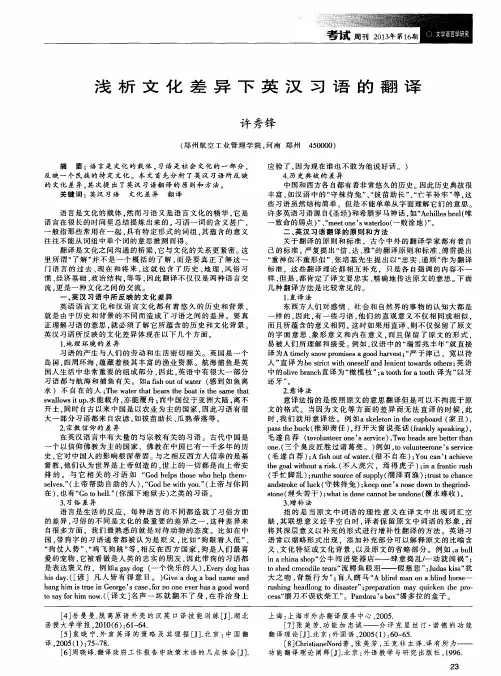
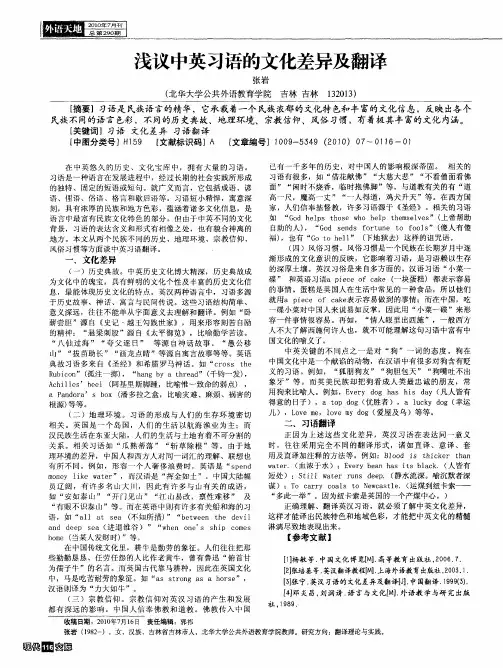
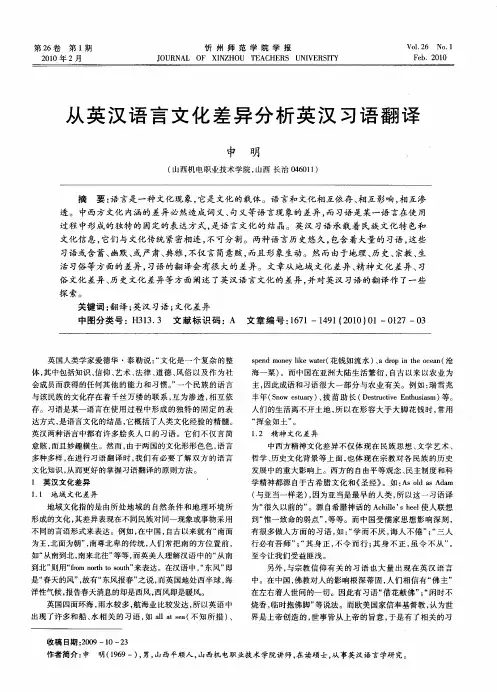
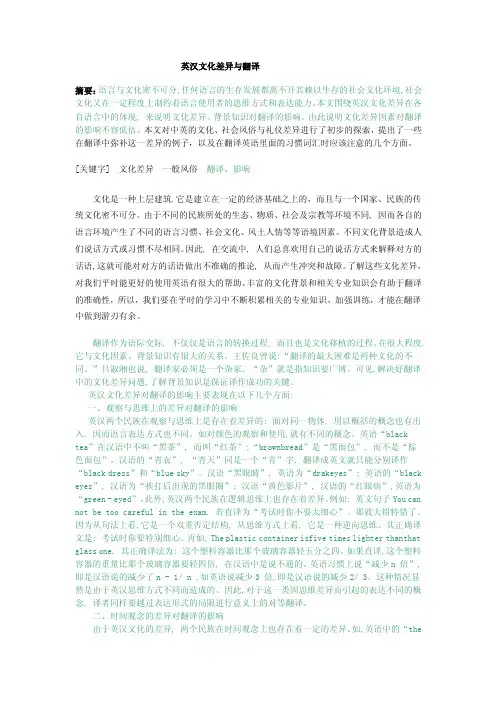
英汉文化差异与翻译摘要:语言与文化密不可分,任何语言的生存发展都离不开其赖以生存的社会文化环境,社会文化又在一定程度上制约着语言使用者的思维方式和表达能力。
本文围绕英汉文化差异在各自语言中的体现, 来说明文化差异、背景知识对翻译的影响。
由此说明文化差异因素对翻译的影响不容低估。
本文对中英的文化、社会风俗与礼仪差异进行了初步的探索,提出了一些在翻译中弥补这一差异的例子,以及在翻译英语里面的习惯词汇时应该注意的几个方面。
[关键字] 文化差异一般风俗翻译、影响文化是一种上层建筑.它是建立在一定的经济基础之上的,而且与一个国家、民族的传统文化密不可分。
由于不同的民族所处的生态、物质、社会及宗教等环境不同, 因而各自的语言环境产生了不同的语言习惯、社会文化、风土人情等等语境因素。
不同文化背景造成人们说话方式或习惯不尽相同。
因此, 在交流中, 人们总喜欢用自己的说话方式来解释对方的话语,这就可能对对方的话语做出不准确的推论, 从而产生冲突和故障。
了解这些文化差异,对我们平时能更好的使用英语有很大的帮助。
丰富的文化背景和相关专业知识会有助于翻译的准确性,所以,我们要在平时的学习中不断积累相关的专业知识,加强训练,才能在翻译中做到游刃有余。
翻译作为语际交际, 不仅仅是语言的转换过程, 而且也是文化移植的过程。
在很大程度, 它与文化因素、背景知识有很大的关系。
王佐良曾说:“翻译的最大困难是两种文化的不同。
”吕淑湘也说, 翻译家必须是一个杂家。
“杂”就是指知识要广博。
可见,解决好翻译中的文化差异问题,了解背景知识是保证译作成功的关键。
英汉文化差异对翻译的影响主要表现在以下几个方面:一、观察与思维上的差异对翻译的影响英汉两个民族在观察与思维上是存在着差异的: 面对同一物体, 用以概括的概念也有出入, 因而语言表达方式也不同。
如对颜色的观察和使用,就有不同的概念。
英语“black tea”在汉语中不叫“黑茶”, 而叫“红茶”;“brownbread”是“黑面包”, 而不是“棕色面包”。
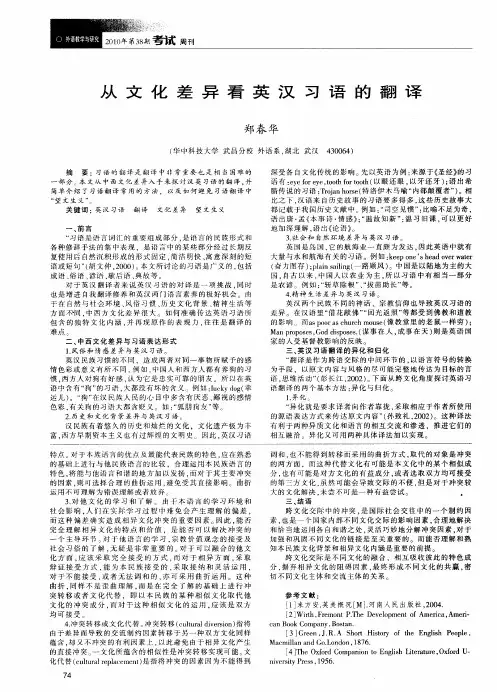
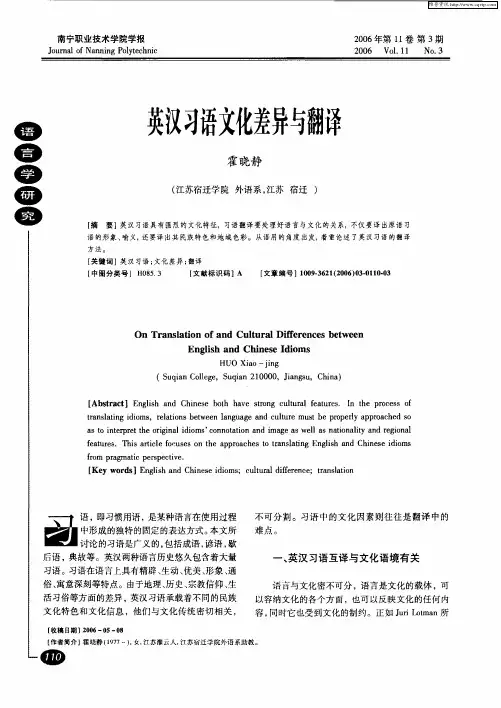
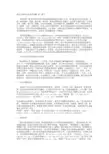
英汉习语的文化差异及翻译--张宁习语是某一语言在使用过程中形成的独特的固定的表达方式。
本文所要讨论的习语是广义的、包括成语、谚语、歇后语、典故等。
英汉两种语言历史悠久,包含着大量的习语,它们或含蓄、幽默、或严肃、典雅,不仅言简意赅,而且形象生动,妙趣横和,给人一种美的享受。
由于地理、历史、宗教信仰、生活习俗等方面的差异,英汉习语承载着不民的民族文化特色和文化信息,它们与文化传统紧密相连,不可分割。
习语中的文化因素往往是翻译中的难点。
本文试图借助语用学的理论,对英汉习语的翻译作一些探索。
美车哲学教授H.P.Grice在他的Meaning一书中把话语的意义分为自然意义(natural meaning)和非自然意义(non-natural meaning)两种。
话语的非自然意义指人们意欲表达的意义,即在特定的场合下表达出交际者意图的语用隐含意义。
这就是Grice的会话含意(conversational implicature)理论的基础。
那么,由于英汉两种语言的文化背景的差异,同样字面意义、形象意义的话语文章可能具有完全不同的隐含意义。
隐含意义才是说话人或作者所要表达的意义。
根据我们的观察,英汉习语之间的多方面差异可归为两类:一是形象意义的差异,一是隐含意义(包括褒贬义)的差异,而它们都是字面以外的意义,是文化差异的具体反映。
由此出发,本文提出了英汉习语文化意义翻译的具体原则和方法。
一、英汉习语中所反映的文化差异朱光潜先生在《谈翻译》一文中说:“外国文学最难了解和翻译的第一是联想的意义……”,“它带有特殊的情感氛围,甚深广而微妙,在字典中无从找出,对文学却极要紧。
如果我们不熟悉一国的人情风俗和文化历史背景,对于文字的这种意义就茫然,尤其是在翻译时这种字义最不易应付。
”英国文化人类学家爱德华·泰勒在《原始文化》(1871)一书中,首次把文化作为一个概念提了出来,并表述为:“文化是一种复杂,它包括知识、信仰、艺术、道德、法律、风俗以及其作社会上习得的能力与习惯。
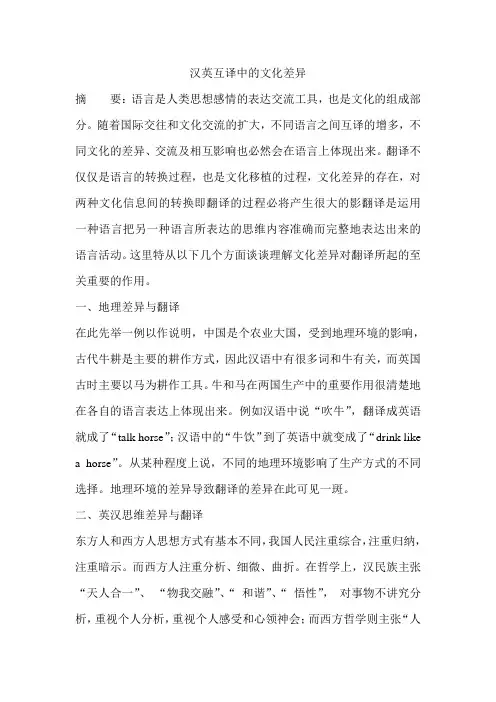
汉英互译中的文化差异摘要:语言是人类思想感情的表达交流工具,也是文化的组成部分。
随着国际交往和文化交流的扩大,不同语言之间互译的增多,不同文化的差异、交流及相互影响也必然会在语言上体现出来。
翻译不仅仅是语言的转换过程,也是文化移植的过程,文化差异的存在,对两种文化信息间的转换即翻译的过程必将产生很大的影翻译是运用一种语言把另一种语言所表达的思维内容准确而完整地表达出来的语言活动。
这里特从以下几个方面谈谈理解文化差异对翻译所起的至关重要的作用。
一、地理差异与翻译在此先举一例以作说明,中国是个农业大国,受到地理环境的影响,古代牛耕是主要的耕作方式,因此汉语中有很多词和牛有关,而英国古时主要以马为耕作工具。
牛和马在两国生产中的重要作用很清楚地在各自的语言表达上体现出来。
例如汉语中说“吹牛”,翻译成英语就成了“talk horse”;汉语中的“牛饮”到了英语中就变成了“drink like a horse”。
从某种程度上说,不同的地理环境影响了生产方式的不同选择。
地理环境的差异导致翻译的差异在此可见一斑。
二、英汉思维差异与翻译东方人和西方人思想方式有基本不同,我国人民注重综合,注重归纳,注重暗示。
而西方人注重分析、细微、曲折。
在哲学上,汉民族主张“天人合一”、“物我交融”、“和谐”、“悟性”,对事物不讲究分析,重视个人分析,重视个人感受和心领神会;而西方哲学则主张“人物分立”,重形式论证和逻辑推理。
例如:January 8, 1976 saw the death of Zhou Enlai, premier of the State Council of P. R. C, member of the Standing Committee of the Political Bureau of the Central Committee of C. P. C, member of the Political Bureau of the Central Committee of C. P. C, member of the Central Committee of C. P. C.中国共产党中央委员会委员,中国共产党中央政治局委员,中国共产党中央委员会政治局常务委员会委员,中华人民共和国国务院总理周恩来同志于1976年1月8日不幸逝世。

英汉的文化差异及翻译外国文学最难了解和翻译的第一是联想的意义,接下来,小编给大家准备了英汉的文化差异及翻译,欢迎大家参考与借鉴。
英汉的文化差异及翻译一、英汉习语中所反映的文化差异朱光潜先生在《谈翻译》一文中说:"外国文学最难了解和翻译的第一是联想的意义……","它带有特殊的情感氛围,甚深广而微妙,在字典中无从找出,对文学却极要紧。
如果我们不熟悉一国的人情风俗和文化历史背景,对于文字的这种意义就茫然,尤其是在翻译时这种字义最不易应付。
"英国文化人类学家爱德华·泰勒在《原始文化》(1871)一书中,首次把文化作为一个概念提了出来,并表述为:"文化是一种复杂,它包括知识、信仰、艺术、道德、法律、风俗以及其作社会上习得的能力与习惯。
"可见文化的覆盖面很广,它是一个复要的系统。
语言作为文化的一个组成部分,反映一个民族丰富多彩的方化现象。
1、生存环境的差异习语的产生与人们的劳动和生活密切相关。
英国是一个岛国,历史上航海业曾一度领先世界;而汉民族在亚洲大陆生活繁衍,人们的生活离不开土地。
比喻花钱浪费,大手大脚,英语是spend money like water,而汉语是"挥金如土"。
英语中有许多关于船和水的习语,在汉语中没有完全相同的对应习语,如to rest on one's oars(暂时歇一歇),to keep one's head above water(奋力图存),all at sea(不知所措)等等。
在汉语的文化氛围中,"东风"即是"春天的风",夏天常与酷署炎热联系在一起,"赤日炎炎似火烧"、"骄阳似火"是常被用来描述夏天的词语。
而英国地处西半球,北温带,海洋性气候,报告春天消息的却是西风,英国著名诗人雪莱的《西风颂》正是对春的讴歌。
![从中英文化差异中浅议英汉习语翻译的区别与比较[1]..](https://uimg.taocdn.com/448bc04b767f5acfa1c7cda6.webp)
从中英文化差异中浅议英汉习语翻译的区别与比较06外语系(3)班06050307 单彩敏1.引言习语又称熟语,它通常包括成语、俗语、谚语、典故等,是一种在意义上和结构上都比较稳定的语言结构。
其表现形式音节优美,音律协调,或含蓄幽默,或严肃典雅,言简意赅,形象生动,妙趣横生,给人一种美的享受。
习语是语言的精华,它带有浓厚的民族色彩和鲜明的文化内涵。
因此对英语读者和汉语读者来说,做到彻底精确地理解蕴含深刻文化内涵的习语的翻译是相对比较困难的。
英汉文化是两种根本不同的文化,它们的渊源和发展道路各不相同。
习语之所以最能鲜明地反映一个民族的文化特点是和这种历史文化的沉积分不开的。
汉语习语和中国文化有着密切的关系,体现了汉民族对客观世界的认识和态度,记述其民族和社会的历史发展过程,呈现出中华民族的文化个性。
同样,英语习语与英美文化历史也有着千丝万缕的联系,其组合结构和修辞方法与英美文化密切相关。
因此, 本文从以下几个方面把英汉习语进行对比,使语言学习者能加深了解这两种语言习语的文化异同,消除交流障碍和困难,提高语言交际能力.摘要习语又称熟语,堪称语言之精华,它通常包括成语、谚语、典故等,是一种在意义上和结构上都比较稳定的语言结构。
它是一个民族历史文化沉积的产物,它最能鲜明地反映一个民族的文化特点。
英汉文化是两种根本不同的文化,它们的渊源和发展道路各不相同。
在此考察了英汉语言中心理与文化的同异现象。
关键词:英汉习语心理文化对比翻译2. 英汉习语的不同所反应的文化背景差异2.1生活环境的差异习语的产生无不与人们生存的环境密切相关。
英国是一个岛国,地处西欧边缘,与西欧很多国家相邻,国内有很多富有特色、享有盛誉的城市和河流,这一特殊的地理环境都反映在习语上,英语中有许多关于船和水的习语,在汉语中没有完全相同的对应习语,比如“between the devil and the deep blue sea (进退维谷)”,“Carry coals to Newcastle”(把煤送到纽卡斯尔———英国的产煤中心),“Set the Thames on fire”(火烧泰晤士河,伟大的壮举)。
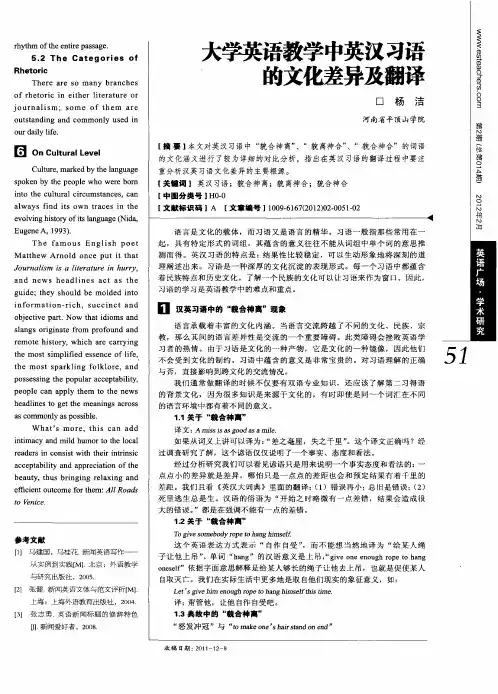
论英汉文化习俗差异下的习语翻译差异习语是某一语言在使用过程中形成的独特的、固定的表达方式。
本文所指习语是就其广义而言,包括成语、谚语、格言、歇后语等。
习语形成于使用过程中,经过实践的考验,逐渐为人们所接受,它们有着固定的结构和浓厚的历史色彩。
习语同文学作品一样是语言的精华:它们承载着一个民族的文化特色和文化信息。
世界上凡历史比较悠久的语言都包含大量的成语,汉、英两种语言即是如此。
由于汉、英两族在历史文化背景、传统习惯及思想方法等方面有显著差异,反映在成语的形象、含义及用法上也大不相同。
习语中的文化因素给翻译带来了困难。
只有通过适当的翻译技巧和方法,才能使译文既能保持原文的特色,又能清楚地表达意思。
一文化习俗的对比1.环境差异习语的形成与人们的劳动生活密切相关。
英国是一个岛国,人们的生活以航海打渔为主;而汉民族生活在亚洲大陆东部,地处北温带,气候比较温和,人们的生活与土地有着不可分割的关系。
由于自然环境和地理上的差异,中国人和西方人对同一词汇的理解、联想也有所不同。
例如,在形容一个人非常奢侈浪费时,英语是“spend money like water”,而汉语是“挥金如土”。
中国是一个内陆国家,幅员辽阔,有许多名山大川,因此有许多与山有关的成语,如“安如泰山”、“开门见山”、“江山易改,禀性难移”及“留得青山在,不愁没柴烧”等。
而在英语中则有许多有关于船和海的习语,在汉语中找不到与之完全对应的习语。
而且,地域不同,各地自然景观亦各有特点,具体反映在语言上也有所不同。
2.传统习俗差异在英语和汉语习语中所反映的风俗习惯差异是多方面的。
“狗”在汉英两个民族文化传统中的价值观念是截然不同的。
汉语中与狗有关的成语几乎都带有贬义,如“狐朋狗党”、“狼心狗肺”、“狗仗人势”、“狗急跳墙”、“狗尾续貂”等。
而英美民族却把狗看成忠诚的伙伴,常用狗来比喻人。
如,“a lucky dog(幸运儿)”,“Every dog has his day.(凡人皆有得意日)”、“not have a dog's chance(毫无机会)”、“Old dog will not learn new tricks.(老人学不了新东西)”等。
论文化差异视角下的英汉习语翻译随着全球化和跨文化交流的不断加深,翻译作为一种跨文化交流手段,变得越来越重要。
无论是商业、文学还是科技领域,翻译都扮演着重要的角色。
英汉习语是两种语言中不可或缺的元素之一。
然而,在进行英汉习语翻译时,由于文化差异,译者需要考虑许多因素。
本文将探讨论文化差异视角下的英汉习语翻译。
首先,我们需要了解习语的定义和特点。
习语是一种固定化的语言形式,其意义和字面意思不一样,通常包含隐喻和比喻。
换句话说,习语不是直接的文字组合,而是人们在日常交流中形成的约定俗成的表达方式。
英汉习语有许多相似之处,比如“大海捞针”和“looking for needle in a haystack”,两者都表示非常困难的事情。
但是,两种语言中的习语也存在许多文化差异。
例如,“猫哭耗子”在汉语中表示水深火热的情况下仍然无动于衷,而在英语中,“when the cat is away, the mice will play”表示没有监管时人们会做坏事。
由于这种文化差异,进行英汉习语翻译需要考虑多个方面。
首先是语言差异。
英语习语通常是句子,而汉语习语则通常是四个字或者八个字的成语。
这些不同的长度和形式都需要考虑到翻译中。
此外,还需要考虑到语境和文化差异。
某些英语习语可能在中国文化中没有体现,或者需要用中国文化中的特定习语来翻译。
除了这些语言和文化差异,翻译者还需要考虑翻译目的。
是要保留源语习语的味道,还是为了跨文化交流而进行本地化?这些问题也需要看情况进行选择。
在进行英汉习语翻译时,我们不能只关注文字本身,还需要了解文化背景和使用场景。
只有这样才能准确、自然地进行翻译。
作为翻译者,我们需要学习不同语言和文化之间的差异,并且不断提高自己的语言水平和跨文化交流能力。
总结来说,英汉习语翻译是一项需要细心、耐心、甚至文化素养的工作。
只有在充分了解语言和文化差异的基础上,才能进行准确、自然和有效的翻译。
英汉习语的文化差异及翻译副标题:作者:佚名文章来源:本站原创点击数:29 更新时间:2005-5-15习语是某一语言在使用过程中形成的独特的固定的表达方式。
本文所要讨论的习语是广义的、包括成语、谚语、歇后语、典故等。
英汉两种语言历史悠久,包含着大量的习语,它们或含蓄、幽默、或严肃、典雅,不仅言简意赅,而且形象生动,妙趣横和,给人一种美的享受。
由于地理、历史、宗教信仰、生活习俗等方面的差异,英汉习语承载着不民的民族文化特色和文化信息,它们与文化传统紧密相连,不可分割。
习语中的文化因素往往是翻译中的难点。
本文试图借助语用学的理论,对英汉习语的翻译作一些探索。
美车哲学教授H.P.Grice在他的Meaning一书中把话语的意义分为自然意义(natural meaning)和非自然意义(non-natural meaning)两种。
话语的非自然意义指人们意欲表达的意义,即在特定的场合下表达出交际者意图的语用隐含意义。
这就是Grice的会话含意(conversational implicature)理论的基础。
那么,由于英汉两种语言的文化背景的差异,同样字面意义、形象意义的话语文章可能具有完全不同的隐含意义。
隐含意义才是说话人或作者所要表达的意义。
根据我们的观察,英汉习语之间的多方面差异可归为两类:一是形象意义的差异,一是隐含意义(包括褒贬义)的差异,而它们都是字面以外的意义,是文化差异的具体反映。
由此出发,本文提出了英汉习语文化意义翻译的具体原则和方法。
一、英汉习语中所反映的文化差异朱光潜先生在《谈翻译》一文中说:“外国文学最难了解和翻译的第一是联想的意义……”,“它带有特殊的情感氛围,甚深广而微妙,在字典中无从找出,对文学却极要紧。
如果我们不熟悉一国的人情风俗和文化历史背景,对于文字的这种意义就茫然,尤其是在翻译时这种字义最不易应付。
”英国文化人类学家爱德华·泰勒在《原始文化》(1871)一书中,首次把文化作为一个概念提了出来,并表述为:“文化是一种复杂,它包括知识、信仰、艺术、道德、法律、风俗以及其作社会上习得的能力与习惯。
”可见文化的覆盖面很广,它是一个复要的系统。
语言作为文化的一个组成部分,反映一个民族丰富多彩的方化现象。
我们经过归纳总结认为,英汉习语所反是非曲直的文化差异主要表现在以下几个方面:1、生存环境的差异习语的产生与人们的劳动和生活密切相关。
英国是一个岛国,历史上航海业曾一度领先世界;而汉民族在亚洲大陆生活繁衍,人们的生活离不开土地。
比喻花钱浪费,大手大脚,英语是spend money like water,而汉语是“挥金如土”。
英语中有许多关于船和水的习语,在汉语中没有完全相同的对应习语,如to rest on one’s oars(暂时歇一歇),to keep one’s head above water(奋力图存),all at sea(不知所措)等等。
在汉语的文化氛围中,“东风”即是“春天的风”,夏天常与酷署炎热联系在一起,“赤日炎炎似火烧”、“骄阳似火”是常被用来描述夏天的词语。
而英国地处西半球,北温带,海洋性气候,报告春天消息的却是西风,英国著名诗人雪莱的《西风颂》正是对春的讴歌。
英国的夏季正是温馨宜人的季节,常与“可爱”、“温和”、“美好”相连。
莎士比亚在他的一首十四行诗中把爱人比作夏天,Shall I compare thee to a summer’s day?/Thou art more lovely and more temperate。
2、习俗差异英汉习俗差异是多方面的,最典型的莫过于在对狗这种动物的态度上。
狗在汉语中是一种卑微的动物。
汉语中与狗有关的习语大都含有贬意:“狐朋狗党”、“狗急跳墙”、“狼心狗肺”、“狗腿子”等,尽管近些年来养庞物狗的人数大大增加,狗的“地位”似乎有所改变,但狗的贬义形象却深深地留在汉语言文化中。
而在西方英语国家,狗被认为是人类最忠诚的朋友。
英语中有关狗的习语除了一部分因受其他语言的影响而含有贬义外,大部分都没有贬义。
在英语习语中,常以狗的形象来比喻人的行为。
如You are a lucky dog(你是一个幸运儿),Every dog has his day(凡人皆有得意日),Old dog will mot learn mew tricks(老人学不了新东西)等等。
形容人“病得厉害”用sick as a dog,“累极了”是dog-tired。
与此相反,中国人十分喜爱猫,用“馋猫”比喻人贪嘴,常有亲呢的成份,而在西方文化中,“猫”被用来比喻“包藏祸心的女人”。
3、宗教信仰方面与宗教信仰有关的习语也大量地出在在英汉语言中。
佛教传入中国已有一千多年的历史,人们相信有“佛主”在左右着人世间的一切,与此有关的习语很多,如“借花献佛”、“闲时不烧香,临时抱佛脚”等。
在西方许多国家,特别是在英美,人们信奉基督教,相关的习语如Good helps those who help themselves(上帝帮助自助的人),也有Go to hell(下地狱去)这样的诅咒。
4、历史典故英汉两种语言中还有大量由历史典故形成的习语,这些习语结构简单,意义深远,往往是不能单从字面意义去理解和翻译的。
如“东施效颦”、“名落孙山”、“叶公好龙”等等。
英语典故习语多来自《圣经》和希腊罗马神话,如Achilles’heel(唯一致命弱点)、meet one’s waterloo(一败涂地)、Penelope’s web(永远完不成的工作)、a Pandora’s box(潘多拉之盒棗灾难、麻烦、祸害的根源)等。
Shallow to discuss culture and education , English of teachingThe language is a carrier of the culture, and a main form of expression of the culture. The language develops with national development, the language is a component of the social nationalculture. Different nationalities have different culture , history , folkways and customs and local conditions and customs ,etc., the culture and social custom of various nationalities show in this national language. The language is due to the culture, culture depends on the language, English teaching is the language teaching, it is certainly due to culture and education.First, why carries on culture and education1. The cultural difference is an obstacle of cross-cultural communicationThe modernized process accelerates the circulation of spirit and physical product, bring each nationality into a common " global village ", cross-cultural communication becomes the indispensable part in life of each nationality. But cultural difference cross-cultural obstacle of communication, overcome communication obstacle that cultural difference cause become whole problem that world faces jointly already. If an enterprise wants to let one's own products sell well in the international market, not merely need superb economic and technological means, is it understand culture , target of country in depth to need , make product this accord with all psychological need , people of target , in package design and practicability. For instance, in China, " dragon (dragon ) " is our spiritual totem, it is a lucky symbol with power , but in order to regard as the successor of the dragon too Chinese are very proud, but in the western human eye, does not have this special emotion to " dragon ", even interpret " dragon " as a kind of terrible monster baring fangs and brandish claws. If one entrepreneur is not qcquainted with this, push the products printed with pattern of " dragon " to the international market, just think the desire to buy whether this kind of product could irritate westerners ? Will you please create the high benefit for enterprises?2. Culture and education is the key to realizing using languages to carry on communicationIt is a final purpose of English teaching to develop communication ability. Language ability is a foundation of the communication ability , but capable of meaning possessing communication in language ability. More and more persons have already reached common understanding, namely communication ability should include five respects : Four skill (listening , speaking , reading and writing ) add social ability(whether namely and from different cultures people carry on suitable ability of communication). But in English teaching, the teacher often relatively pays attention to the external form of the language and grammar structure, namely train students to produce the sentence which conform with the rule of grammer , and has ignored the social environment of the language, especially cultural difference of language, so it is difficult for student not to know what occasion should what does it say, thus ignored students' communication ability . Here, the role in English teaching of the cultural difference of the language has been mentioned as an important problem.Second, content of culture and educationWhether among English teaching practice, cultural difference show in the following eight aspects to the interference that students bring mainly.1. The addressPeople teach society JEFC teaching material Book 3 Lesson among the 14 The man upstairs , appear " I' m sorry to trouble you , comrade ". "Apology language. " comrade " is owned by socialist state only call , does not know its one's stranger daily Sir and Madam in English country's call. If the people of we and English country match with comrade, their are wonderful that they will feel Mo Ming. is in JEFC Book 3 Lesson 34 Uncle Wang' s Factory, students call a worker " Uncle Wang ", this is that Chinese thinking applies the phenomenon of Englishmechanically too. Whether relative appellation of Chinese is it suffused with inclination used to take to have, daily on between the relative. Young people call " uncle " , " auntie " to the elder ; To of the same generation to claim " eldest brother " , " elder sister ". But in English, relative's appellation is not widely used in the social activity . If the elder that we are English to the mother tongue calls " Uncle Smith " , " Auntie Brow n ", the other side has listened to and will not think it very pleasing to the ear. Have only not lasting this kind of relative of appellations English culture in very close relations situation and behind area surnamed, only take the name, such as " Uncle Tom ".And for example students know the meaning of teacher is " teacher ", call " Mr. Wang " Teacher Wang accordingly too. In fact, teacher is only a kind of job in English; Chinese has tradition of respecting teachers, " teacher " has already not merely been a kind of job, but become a kind of honorific title to the person. Because of the difference on this kind of culture , cause students' simple understanding: Mr. Wang =Teacher Wang. In addition Chinese " secretary Tang " of call traditionally, " nurse Zhang " call Secretary Tang, Nurse Zhang, the people of English country sound to feel inconceivable. English call people spend Mr generally. ,Miss, Mrs. ,etc.. 2. Express gratitude to and thank for Generally speaking, we Chinese seldom use and " thanks " among kinsfolks. If use, it will be very strange that it sounds, or there are distances on interreaction. In English country " Thank you ". "Nearly used in all occasions, between all people, even parents and children, no exception between siblings. Sending to a bottle of beverages, prepare a table of delicious meals , the other side will all say a sound of " Thank you " . "unless it is public occasion, whether it do anything for you others,you thoroughfare each "Thank you. " . This is courtesy at least.When others ask (Would you like something to eat/ whether want to have some or what are drunk? drink? ),We usually get used to being courteous, answer: Have not " used ", " don't be troublesome ",etc.. According to the habit of English country, if you want , needn't decline , say " Yes , please ". " want No , thanks if not , so long as say ". "Do. This has fully reflected too Chinese are implicit with national people's broad and level and frank different styles of English.3. PraiseIn English country, praise comes dailily as the introduction of talking too. There are personal appearance , appearance , thing , personal property , individual's outstanding work from bought newly ,etc. mainly in contents of praise. Praise her result hard (dress up ) only when praising others' appearance for usually, but not her natural beauty. So there is a lot of one that praised others' hairdo, there are few ones that praised others' beautiful hair. To others' praise, the most ordinary answer is: " Thank you. "For instance,A: Your skirt looks nice. B: Thank you.4. Personal secretsChinese met and asked about the age , marriage , income care about for the first time, national people of English are relatively disgusted with this , think all these involve individual privacy. If there is such a dialogue in JEFC Book 1 Lesson 16: " How old are you, Mrs Read? " " Ah, it' s a secret! "Why is Mrs Read unwilling to tell one's own age? Because national people of English hope to seem energetic in the other side's eyes oneself, the youth stays forever, keep one's own actual age secret, women are even more like this. Chinese for another example care about " where will you go? " ( Where are you going? )With " what are you do? " ( What are you doing? )Is it spy inquest , others of personal secrets monitor others' words but unwelcome to become amongEnglish.5. GreetingChinese greet and get used to asking at ordinary times: "Have you had a meal? " ( Have you had your dinner? )If you say so with people , English of country , they think you are to invite them to dinner. National people of English greet and usually regard weather , health status , traffic , sports and interest hobby as the topic.6. IntroducePeople teach the society of the JEFC Book 1 " What' s your name? "The frequency appearing is quite high, in which situation to uses and explains freshly but it. In fact, the people of English country generally in troduce one's own name first while talking, such as " I am " …"The other side will tell one's own name at once naturally . Even when the occasion of filling in the form , speaking face to face etc. needs the name of asking about , generally only talk about " You name ", please? "or "May I know your name? " if use " What' s your name? ",feeling it have each interrogate they.7. FestivalThe cultural differences of China and country of English also behave in festival remarkably. Besides common festival (such as New Year' s Day) of China and country of English, both sides also each have one's own unique festival, there is the Spring Festival , the Dragon Festival in China, Mid-Autumn Day ,etc.; English country have Valentine ' s Day (Valentine's Day ), Easter (Easter ), April Fool ' s Day (the April Fool's Day), Mother' s Day (Mother's Day ), Thanks Giving Day (Thanksgiving Day ) and Christmas Day (Christmas Day ),etc.. The China and Western folkways and customs in festival are not very the same either; This fully reflects in people teach the society JEFC teaching material, such as JEFC Book 2 Unit 3 Mid-Autumn Day and Book 3 Unit l3 Merry Christmas! During festival, to the present that others sent here, the people of Chinese and English country demonstrate different attitudes. Chinese will often decline , behave helplessly and accept , does not generally open face to face either after accepting. If open and radiant with joy face to face , may cause the " greedy for money suspicion " . In the culture of English, people will generally all open and praise face to face to the gift that others sent, and express one's gratitude joyfully .8. Cultural intension of the vocabularyEnglish vocabulary accumulate abundant cultural intension of not longing run , should pay attention to the introduction of cultural meaning of English vocabulary of teaching, in case students make subjective appraisal from the vocabulary itself simply. Such as red one word, no matter or in China, the red often relates to the celebration or joyous day in English country, there is " red-letter days " in English (festivals or holidays). Especially in China, the red symbolizes such positive meanings as the revolution and socialism ,etc., but " red " in English still means the precarious position or makes people angry, if " red flag " ( guides people's angry thing ). There is " in the red " in seeing commercial English , don't think that make profits , opposite, express the loss , debt.Third, method of culture and educationMethod of culture and education varied, teacher should adopt flexible changeable method raise student sensitiveness to culture, train cultural consciousness , enable them voluntarily , absorb and incorporate in the new cultural environment consciously.1. Strengthen the comparison of the Chinese and Western cultural difference, call Chinese and Western culture, greet language , thank you , be modest , praise , care about , talk subject matter and values difference of respect conscientious to permeate through English of the teaching naturally.2. Utilize many kinds of channels , many kinds of means, absorb and experience the culture of foreign country. Can collect the article and picture of some English countries , let students find out about foreign art , history and local conditions and customs; Use such materials as English movie & TV , slide show , video ,etc. to give students ocular feeling, make student's reality to English used and influenced by the surroundingsed . Recommend to student and read the simple and easy reader which reflects foreign culture, in order to increase the knowledge of culture of English; " English is coherent " to make the specialist papers of Chinese and foreign cultural differences to invite China and foreign countries; Organize the English corner, English party ,etc., found the various informative language environment, strengthen the actual application to cultural knowledge.In a word,among it is at English teaching can only attention language teaching not simple,and must strengthen there aren't culture of language, pay attention to the cultural difference of the language and impact on language. Only in this way , could use languages correctly in reality .。